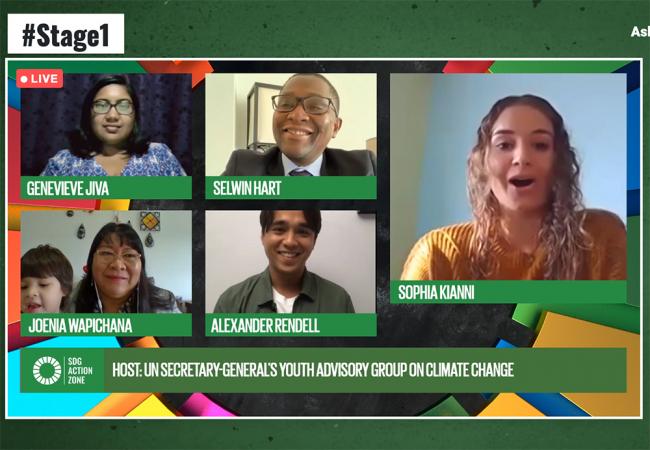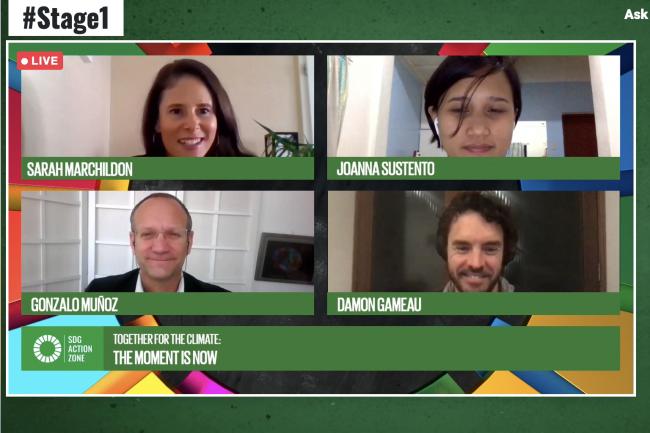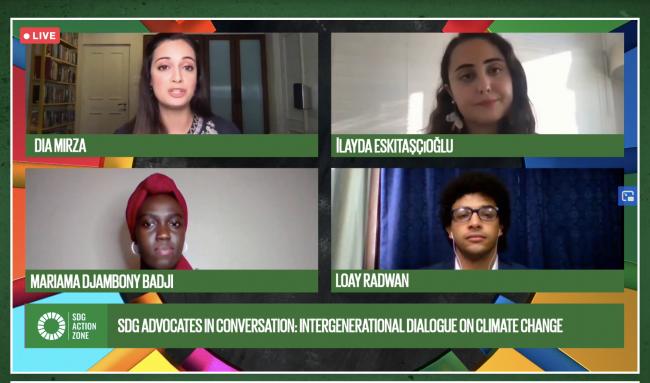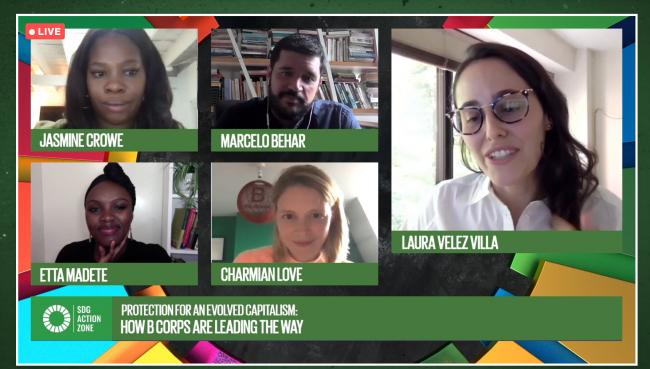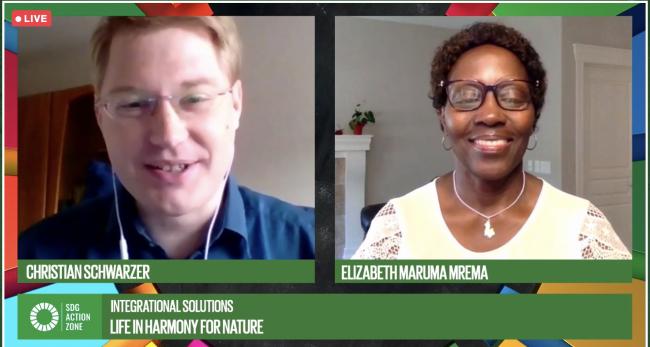SDG Action Zone: Planet
Plenary - The Big picture
The opening session set the scene for the day’s discussions, with speakers highlighting climate change, individual leadership, and the roles of indigenous people and youth.
Moderator Sophia Kianni, Climate Cardinals, identified the session’s goal as defining the “new normal” for climate action and advancing the UN Secretary-General’s climate-positive actions to recover from the pandemic.
On leadership, Genevieve Jiva, Pacific Islands Climate Action Network, called on leaders to ramp up climate action and to move away from fossil fuels and towards a just recovery that is people-centered, context-sensitive, and leaves no one behind. Alexander Rendell, actor and UN Environment Programme National Goodwill Ambassador for Thailand, highlighted the influence of high-profile individuals, such as actors, in shaping a society’s mindset, stating they have a responsibility to educate people on the “triple planetary crisis” of climate change, biodiversity loss, and pollution. Rendell also emphasized instilling a belief that individuals can collectively make a big difference.
Regarding the role of indigenous people, Joênia Wapichana, the first indigenous woman Deputy elected to Brazil’s National Congress, lamented that indigenous people continue to be insufficiently recognized for their social and environmental services to the planet. She described work by the Indigenous Council of Roraima to document the impacts of climate change and achieve food security. Wapichana also urged support for indigenous people’s political participation.
In terms of young people, Selwin Hart, Special Adviser to the Secretary-General on Climate Action, observed that governments are currently mobilizing trillions of dollars to support economic recovery and job creation, and called on youth to press governments to ensure they invest in the future. This, he said, includes clean energy, resilience, and inclusiveness, and excludes polluting industries that jeopardize achieving the goals of the Paris Agreement.
Genevieve Jiva affirmed that youth can make a difference by getting involved in the climate movement.
Closing the session, Sophia Kianni expressed hope that these messages will convince the audience that “together we are stronger.”
Together for the Climate: The moment is now
The impact of COVID-19, the value of storytelling and the media, aggregating the efforts of non-state actors, and the need to accelerate the transformation of our economic systems emerged as major themes during this session on the climate emergency.
In terms of COVID-19, Moderator Sarah Marchildon, UN Global Climate Action Awards, UNFCCC Secretariat, said the pandemic has not stopped the climate emergency and the need to rebalance our relationship with nature remains equally urgent. Joanna Sustento, Greenpeace, shared how surviving super-typhoon Haiyan motivated her work as a climate activist. She said disasters like typhoons and now COVID-19 magnify the inequalities and problems of the existing, “broken” social and economic systems.
On storytelling, Sustento explained how telling her community’s story helps humanize climate change and make it more relatable. Producer Damon Gameau explained how his documentary, 2040, is based on “fact-based dreaming,” showing an extrapolation of things already happening around the world to tell a story that is grounded in reality of “what lies on the other side of the crisis.” He said fear-based narratives and scientific language do not “stir the souls” and storytelling that inspires hope is therefore needed.
Gonzalo Muñoz, UN High-Level Climate Champion for COP 25, provided an update of the Climate Ambition Alliance, launched at the 2019 Climate Action Summit, and its Race to Zero campaign, launched during the UNFCCC June Momentum meetings, which are working towards a net-zero, resilient world before 2050 through voluntary commitments by a variety of non-state actors. He said the aim is to raise awareness and increase the campaign’s membership tenfold by COP 26 in 2021.
In terms of economic systems and what is still required to realize the goals of the Paris Agreement, Sustento said leaders, corporations, and communities must accept that “Earth is not a commodity, it is home.” Gameau stressed the need to move away from a system based on extraction and domination. Muñoz identified energy, food, and finance as the key economic sectors where systemic transitions should be accelerated.
Sarah Marchildon closed the session observing positive momentum and expressing belief that “we can do this.”
SDG Advocates in Conversation: Intergenerational dialogue on climate change
Climate justice, human rights, and the role of technology and training were key themes during this session.
On the meaning of climate justice and injustice, Loay Radwan of G-Beetle, a company helping farmers in Egypt adapt to climate change through the use of technology, pointed to a study by Oxfam which found that the richest one percent of the world’s population is responsible for more than double the emissions of the poorest half. Ilayda Eskitascioglu, We Need to Talk, a Turkish initiative working against period poverty and stigma, said that, while no-one is immune to the climate crisis, women and girls tend to be the most affected. Mariama Djambony Badji, DNA SARL, a Senegalese ecological construction company, stressed the need for need fair treatment of all and freedom of discrimination in climate change policies.
On the links between climate change and human rights, Eskitascioglu described the climate crisis as a threat to life, health, socioeconomic rights, and the right to a healthy environment. She stated that legal systems worldwide are not ready to accommodate the crisis and are predominantly focused on what governments should do, while ignoring corporate accountability.
On uses of technology to support adaptation in agriculture, Loay Radwan provided the example of technologies that detect plant infestations in their early stages allowing to minimize damage. He noted that demonstrating how technology can help farmers conserve resources helps build trust in its potential among rural communities who are often change-averse. Djambony Badji suggested promoting training and awareness activities to help make the SDGs more relevant for climate activists.
Closing the session, Moderator Dia Mirza, UNEP Goodwill Ambassador, expressed hope that more people will recognize the link between humans and nature and do all they can to build back better. She encouraged people to adopt the SDGs at the individual level.
Protection for an Evolved Capitalism: How B Corps are leading the way
This session highlighted how companies are integrating SDG 12 (Responsible Consumption and Production) into their operations. Key themes that emerged included the importance of scalability, use of sustainable materials, and recognizing the flaws in the current economic model.
On integrating SDG 12 into business models, Jasmine Crowe, Goodr, a company working on food waste prevention, highlighted that 33 billion kilograms of food are wasted every year in the United States. She said her company works to draw companies’ attention to the implications of food waste for ending hunger. Marcelo Behar, beauty group Natura & Co, explained how his company sources products directly from communities while also promoting a positive change in how they conduct business and preserve the environment. He said Natura & Co is protecting a land area equivalent to half the size of the Netherlands and will double this area over the next decade.
Etta Madete, BuildX Studio, a design and construction company focused on sustainable materials, said companies in her sector cannot claim to build sustainably without taking into account the entire value chain. She said that focusing on SDG 12 and circularity has helped reframe her business, including placing an emphasis on energy efficiency and sustainable sourcing of materials.
On scalable innovations around SDG 12 that are replicable, participants shared that:
- France and Italy have made food waste illegal;
- implementing nature-based solutions should be scaled up, with the speaker from Natura citing the example of a campaign that helped preserve the ucuuba tree by turning its seeds into a source of better income for communities that had previously used the tree for broomsticks;
- education has a role in generating and sharing good practices on SDG 12 practices; and
- building prototypes that are accessible for everyone to scale up and that stimulate public demand for better solutions is necessary, because “a sustainable solution is only sustainable if it is scalable.”
On the flaws in the current model of growth, Charmian Love, Skoll Centre for Social Entrepreneurship and co-founder of B-Lab UK, compared implementing SDG 12 to addressing a paradox: first one has to accept it, then confront it, and finally transcend it. She noted companies are now accepting that there is a problem with the current model of growth, and some have started addressing the challenge and even transcending it.
Closing the session, Moderator Laura Velez Villa of B Lab, a non-profit entity that awards the B Corp certification of social and environmental performance for companies, highlighted B Lab’s SDG Action Manager as a tool for businesses to identify ways to improve their sustainability performance and, as a message for consumers, reminded that “every purchase is an opportunity to have an impact.”
Intergenerational Solutions: Life in harmony for nature
This session, which considered how to achieve the 2050 vision of the Convention on Biological Diversity (CBD), “living in harmony with nature,” highlighted several key issues, including intergenerational equity, stakeholder participation, indigenous rights, local action, youth, and gender issues.
In terms of intergenerational equity, Shamila Nair-Bedouelle, UN Educational, Scientific and Cultural Organization (UNESCO), called for the construction of a new pact with the living world. She invited all to join UNESCO’s and UNEP’s Coalition for Nature initiative that aims to promote intergenerational equity through reconnecting with nature. Swetha Stotra Bashyam, Global Youth Biodiversity Network, called for recognizing that youth understand the current technology-dominated world and can bring fresh ideas to the table, noting that support from, and trust by, some governments has enabled a growing youth movement in support of biodiversity.
Regarding stakeholder participation, Keiichi Nakazawa, Ministry of the Environment, Japan, lamented that the global community has not achieved the Aichi Biodiversity Targets. He called for a platform to enable the participation of all stakeholders to implement the post-2020 framework and the CBD’s vision.
On supporting youth, Kiruben Naicker, Department of Environment, Forestry and Fisheries, South Africa, stressed the need to engage them in the post-2020 framework process since youth today will be implementing these decisions and their ownership and accountability is crucial for success.
On leveraging indigenous people’s support for the vision, Abigail Kitma, Tebtebba, identified as key: recognizing and protecting indigenous rights to land; promoting cultural biodiversity values; and valuing different members of society, and knowledge systems that are locally-adapted.
In terms of turning local-level actors into allies, Eugenia Arguedas, CBD National Focal Point of Costa Rica, said governments need to give: marginalized groups “opportunities to understand that wellness is not just unsustainable consumption”; traditional knowledge equal value with Western knowledge; and access to decision-making processes, including through public participation.
On engaging women and girls, Amelia Arreguín Prado, CBD Women’s Caucus, stressed the need to consider women’s and girls’ knowledge in decision-making and guarantee their full participation in environmental governance.
CBD Executive Secretary Elizabeth Maruma Mrema closed the session stressing that, in order to enable participation by all stakeholders in biodiversity conservation, formal institutions must listen to their multiple voices and provide concrete support for them to take action.
Conclusion:
Following a full day of discussions about how human activities intersect with our natural planet and impact and disrupt nature’s cycles, participants concluded that:
- all stakeholders need to transcend their differences in order to work together to protect the planet;
- different generations are required to develop solutions, but the youth are especially important since their future is hanging in the balance; and
- the role of cities and corporates in steering society’s behavior towards greener and more sustainable ways of living is critical.
Participants can look forward to the third SDG Action Zone day to consider how partnerships can achieve some of these ideals.
